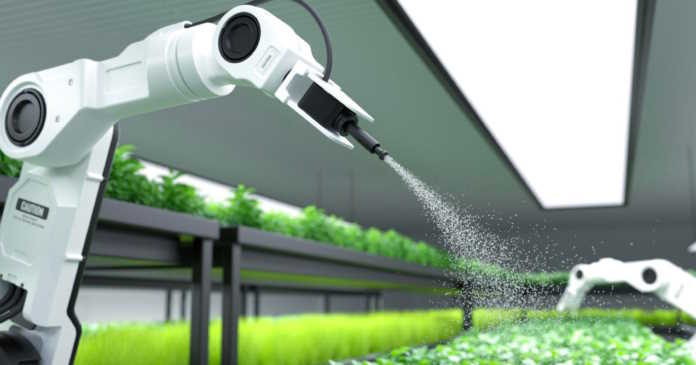Artificial Intelligence (AI) is a cutting-edge technology that is revolutionizing several sectors, including agriculture. AI-based technologies, such as Machine Learning (ML), deep learning, computer vision, and predictive analytics, are providing businesses with unprecedented levels of efficiency and productivity.
AI software applications and solutions are transforming traditional workflows, allowing businesses to optimize their operations and gain a competitive edge in the market. AI is a powerful tool that is being utilized to drive innovation and create new opportunities for businesses around the world.
The agricultural sector is experiencing significant growth in the utilization of Artificial Intelligence (AI) drones. This trend is seen across the world as AI is being utilized to address the challenges of population growth, climate conditions, food quality, quantity, and security.
To meet these demands, the agricultural industry is increasingly relying on AI applications to automate 70% of manual tasks, monitor crop health remotely, and increase crop yields. This adoption of AI in the agricultural industry is expected to have a positive impact on the industry in the coming years.
This blog will help you understand the various applications of AI in your agriculture business. Furthermore, it is vital to understand that a dedicated agriculture software development company can help you design AI-based software for your business while catering to your custom requirements.
Comprehending the applications of AI for your agriculture business:
1. Crop and Soil Monitoring
Agricultural organizations are leveraging computer vision and deep-learning algorithms to process the data received from AI drones to monitor crop and soil health. AI drones are being utilized in agriculture to remotely and continuously monitor the quality of soil, thereby ensuring the healthy growth of crops.
For instance, Trace Genomics, a California-based organization that provides soil study services to farmers, raised $8 million in equity funding from six companies in February 2017.
The utilization of Machine Learning (ML) and Artificial Intelligence (AI) in agriculture can provide invaluable insights into the quality of the soil. Through a detailed summary of field soil contents, these applications can be used to inform farmers of the current state of the soil, allowing them to make immediate decisions towards improving its quality. This could prove to be a crucial factor in the success of their crops and, ultimately, their livelihoods.
2. AI-Powered Smart Robotics Harvesting
Currently, automation is progressing at a rapid rate, providing solutions to the challenges posed by the workforce. Reports suggest that there will be a 6% decrease in agricultural labor by 2024. This would result in a significant financial loss for farmers in areas such as Arizona and California.
To combat this, farmers have begun to invest in AI applications. The agricultural industry is utilizing AI-powered robots to automate tasks and reduce the need for manual labor. Research analysts have found that AI robots can harvest approximately 8 acres in just 24 hours, allowing crop owners to reduce the number of human laborers and overhead costs by replacing them with AI robots.
3. Detecting Pests or Weeds
The role of artificial intelligence in the agriculture sector is becoming increasingly important, as it helps farmers to find various competent approaches to safeguard their farms from pests or weeds. A leading digital solutions developer in California, USA, Blue River Technology is creating computer vision, machine learning, and robotic solutions for the agricultural industry.
Their robot uses algorithms based on computer vision to monitor and accurately detect weeds, helping farmers to prevent herbicide resistance in the crop.
According to the company’s sources, precision technology can reduce the need for chemicals sprayed on crops by up to 80%, resulting in a 90% decrease in herbicide costs. This technology can be used in both India and the USA and has proven to be incredibly effective in helping farmers monitor weed growth remotely, control pests, and yield healthier crops.
4. Weather Forecasting
Artificial Intelligence (AI) has become one of the most important applications in the agricultural industry. AI can be used to analyze weather conditions, providing farmers with valuable data insights that can help them plan their farming activities. For example, intelligent AI applications can be used to determine the best time to sow seeds based on the prevailing weather conditions. AI is thus playing a key role in helping farmers maximize their yields and ensure successful harvests.
5. Predictive Analysis
Predictive analytics can be a true game-changer for farmers. By utilizing AI, they can collect and process significantly more data in a much faster time frame. AI can be used to analyze market demand, forecast prices, and determine the optimal time for sowing and harvesting, all of which are key challenges that can be solved with AI. Additionally, AI can be used to gather soil health insights, provide fertilizer recommendations, monitor the weather, and track the readiness of produce, allowing farmers to make better decisions throughout the crop cultivation process.
End Note
Throughout the course of human history, technology has been employed extensively in the field of agriculture to increase efficiency and reduce the need for manual labor. From the invention of the plow to the development of tractors and the utilization of modern artificial intelligence, the relationship between humans and agriculture has been continually evolving. Now, with the growing accessibility of computer vision, we are on the cusp of yet another advancement in this area. This technology promises to revolutionize the way we approach agriculture, providing us with unprecedented levels of insight and control.












